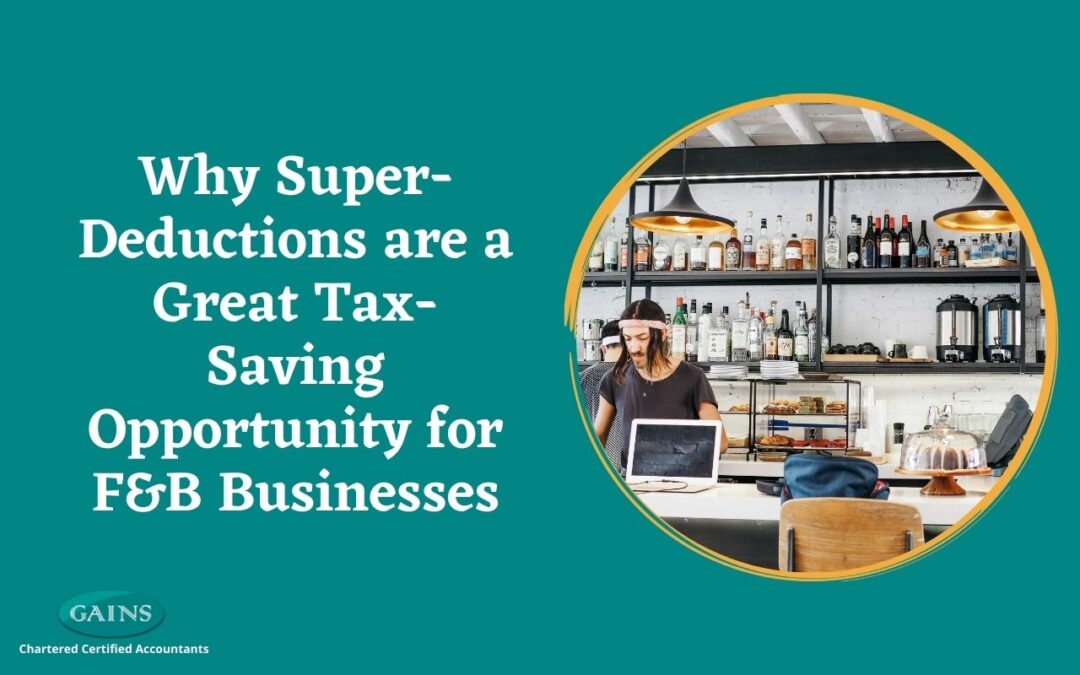The UK government has announced tax super-deductions for businesses to boost investment and stimulate economic growth. This presents an exciting and lucrative opportunity for food & beverage business owners to invest in expansion and seriously slash their tax bill. We’ve put together all of the important information you need to know about super-deductions and how you can use them to grow your F&B business.
What Does This Mean for F&B Businesses?
Super-deductions represent a fantastic opportunity for F&B businesses to expand in the wake of the pandemic.
Unfortunately, months of lockdowns and restrictions were tough for cafes and restaurants, and many closed their doors permanently. Although this is sad news, the silver lining is that surviving F&B businesses are now enjoying reduced competition and are consequently well-positioned to capitalise on greater market opportunities.
It’s also worth noting that the food delivery market grew by £3.2 billion during 2020 and takeaway delivery service Just Eat saw a further 76% increase in orders during the first six months of 2021. Meanwhile, Lumina Intelligence predicts that the market will continue to see robust growth throughout 2022 and estimates that it will be worth £12.6 billion by 2024. Therefore, super-deductions have come at an ideal time for F&B businesses looking to expand their delivery services.
F&B business owners can use the super-deduction allowances to invest in growth and increase their market share whilst saving a significant sum in tax. This is a chance to power your business forward and create a bigger, more profitable and sustainable enterprise.
What are Super-Deductions?
Super-deduction allowances are new tax incentives to encourage business investment.
Prior to the pandemic, business investment levels in the UK were already low compared to competing nations and covid-19 made matters worse. Between Q3 2019 – Q3 2020, business investment fell by 11.6%.
In order to address this, between April 2021 – March 2023, businesses will be able to claim:
- A 130% first-year allowance for qualifying plant and machinery assets, which means that every £1 they invest will reduce their tax bill by 25p.
- A 50% first-year allowance for qualifying special rate assets.
These new incentives mean that a company that spends £1 million on qualifying plant and machinery assets would be able to deduct £1.3 million from its taxable profits. The corporation tax rate is currently 19%, so this would result in a saving of £247,000.
Unlike the Annual Investment Allowance, there is no cap on the super-deductions. Only limited companies can claim super-deductions; they are not available for partnerships or sole traders.
Should F&B Businesses Incorporate in Order to Claim?
Since the super-deductions are not available for sole traders and partnerships, it may be worth considering incorporating your F&B business, but there are caveats to consider.
First of all, you should be aiming to make a substantial investment in your business. The rate of corporation tax will increase from 19% to 25% in 2023, so incorporating is most beneficial for business owners who are committed to growth.
Ultimately, this decision should be based on your long-term expansion strategy and ability to produce a profit. If you’re ready to grow your business into a profitable chain, then you stand to benefit from super-deductions. However, if you wish to remain small then incorporating your business may not be the best path for you.
Qualifying Expenses
In order for plant and machinery equipment to qualify for super-deductions, it has to be used in the business. You can’t claim for any equipment that you lease or rent to customers.
Examples of qualifying expenses include:
- Computers
- Office equipment
- Ovens
- Refrigerators
- Vans and lorries
- Integral building features such as ventilation systems, lifts and solar shading
You can not claim super-deductions for:
- Building and structures, with the exception of integral features
- Cars
- Second-hand assets
- Contracts entered before 3 March 2021
Hire Purchases
If you acquire an asset through hire purchase and thus do not actually own the asset, you may still be able to claim it under the super-deduction allowance. However, you will only be able to claim after the asset has been brought into use.
Finance Leases
Since finance leases are essentially equivalent to a loan, the assets would be treated as such and would not qualify for super-deduction.
Next Steps
Business owners who are ready to create a thriving, profitable chain of cafes, restaurants or delivery kitchens should take advantage of super-deductions as soon as possible. These deductions are an amazing opportunity to take your business to the next level, so the time to act is now.
The longer you delay action, the less tax you will save. The Office for Budget Responsibility calculated that the super-deductions are ten times more generous than the tax breaks introduced after the financial crash of 2008, so this really is an unprecedented opportunity for business owners.
If you’re ready to invest in your F&B business, this is an opportunity you simply cannot afford to pass up. Get in contact with us today to discuss super-deductions in further detail and find out more about how you can leverage them. As specialist F&B accountants, we’re here to ensure that you get the most out of these incentives and to help you build a bright future for your business. This is a once-in-a lifetime opportunity and we want to make sure you don’t miss out!
